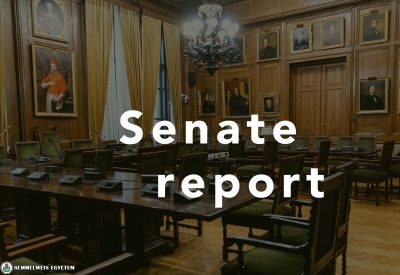At its May meeting, the Senate of Semmelweis University discussed modifications to the sixth-year study program of the Faculty of Medicine, and supported the integration of four vocational public education institutions conducting health care training into the university. The results of the successfully completed Senate elections were also presented at the meeting, and the establishment of a Sports Medicine Department was approved.
Prior to the discussion of the agenda points, rector Dr. Béla Merkely informed the members of the Senate that the Senate election was concluded successfully, with the basic democratic principles – direct election, secret ballot, proportional and single representation – adhered to. Eligible voters decided on the mandates of 27 senators employed as lecturers, researchers or professors, and turnout was around 70%. Rector emeritus Dr. Ágoston Szél, the chairman of the Election Committee, announced the names of the winners from the eight election districts. The new body, which will remain comprised of 45 members but in a modified structure – in line with the Act on Higher Education – will start its operation on July 1, 2019, with a four-year mandate.
Related to the ongoing curriculum reform, the meeting accepted the proposed changes to the study program of the sixth-year (comprehensive exam year) of the general medicine program. Important elements of change are the introduction of a six-week elective clinical practice, extending the length of the transfusion medicine course from 6 days to two weeks, and reinstituting the weekly practice time of 40 hours, including the on-call practice. The elective clinical practice can be completed at any department, clinic or department group of Semmelweis University. For international students and students taking part in the Erasmus program, it will also be possible to complete the six-week practice in clinics or university teaching hospitals operating in the European Union, the United States, or Canada that are accredited by Semmelweis University or the Hungarian Accreditation Committee. The new six-week training element, which is completely new in medical training in Hungary, will give sixth-year students an opportunity to immerse themselves in the discipline of their choice, helping them strengthen the foundations for their specialist orientation. The new elements will be introduced in the 2019/20 academic year, which is also the 250th anniversary of the university’s foundation. In this first academic year, sixth-year students will have the choice of completing their courses in line with the previous, or the new curriculum.
The Ministry for Innovation and Technology and the Ministry of Human Capacities have made decisions in principle on changes in the operators overseeing the functioning of some public education institutions performing health care training. As a result, Semmelweis University will oversee the operations of the János Bókay Vocational High School, the Raoul Wallenberg Vocational High School and the Ignác Semmelweis Vocational School of the Budapest Center of Catering and Human Training (BVHSZC), as well as the Dorottya Kanizsai Health Care Vocational High School of the Salgótarján Vocational Center. The strategic objective behind the decision is developing the secondary vocational education that teaches the new generation of health care professionals, and making better use of the conditions for practical training, the proposal said. The four schools together have more than 1,900 day students and 900 students taking part in adult education. The Senate supported the integration of the schools named in the proposal, as well as the creation of a working group to carry out the implementation.
Senators supported the establishment if the Health Care Technology Evaluation and Analysis Center. The center will start operations in July 1 as an educational-research organizational unit directly controlled by the rector and with its own budget. Its task is to provide professional support activities to other units of the university, including evaluating health care and technology matters, as well as carrying out coordination and education tasks. The center fits into the university’s future goals regarding research and innovation, i.e. the development of the renewable innovation ecosystem and the Science and Innovation Park.
A decision was made to establish a Department of Sports Medicine at the Városmajor Heart and Vascular Center, where all the necessary material and personnel conditions, as well as expertise, is available. The new department will operate in close cooperation with the National Institute for Sports Medicine and the Department of Traumatology. With the department created, a sports medicine course can be introduced to undergraduate education, with the objective of teaching doctors graduating the university up-to-date skills with regard to treating athletes.
Senators also ranked ongoing applications for executive, as well as teaching-research positions. They also voted on awarding professor emeritus titles, recommendations for state and ministerial awards for 2020, awarding titles to lecturers, and awarding the Semmelweis University Outstanding Lecturer title.
The Senate accepted the proposal on the supplemented Management Regulations, including the involvement of the trade union and the Civil Servant Council in the process of preparing the executive management budget. The Senate also decided at the meeting on uniform regulations for demonstrator stipends for all the university faculties.
Eszter Keresztes
Translation: Tamás Deme


